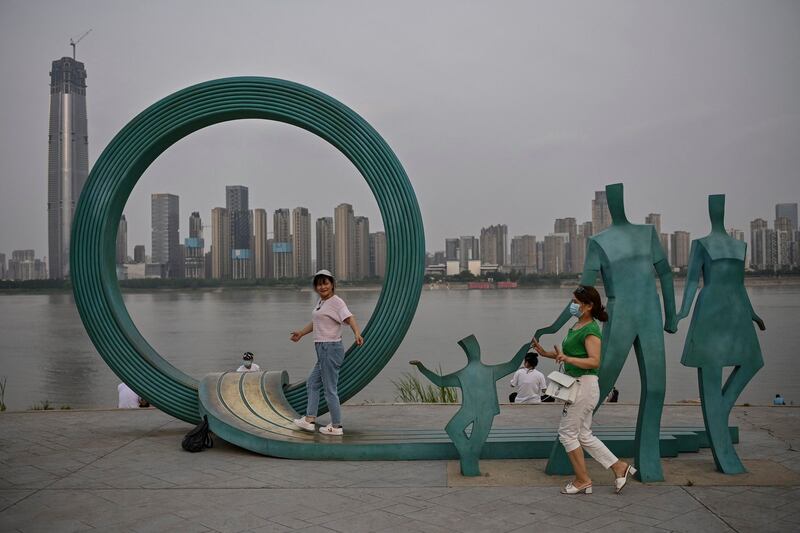A riverside sculpture in the central Chinese city of Wuhan of a mother, father and single child has spooked local residents by appearing to have given birth to two extra offspring as the ruling Communist Party tries to encourage people to have more kids to boost flagging birth rates.
The sculpture in Wuhan's Jiangtan Park, titled "A Better Future,” was created by Guo Xue in 2017 to show the "beauty and happiness” of family life, according to media reports.
Guo was recently asked to give his work a makeover by the management team at the park, and added two extra children to reflect the government's current "three-child" policy, rather than the one-child policy of recent decades, according to the Lai Times.
"The old family planning policies have changed ... because society is aging now, and the birth rate has declined," a resident of Wuhan who gave only the surname Mou for fear of reprisals told Radio Free Asia.
"I think the government is trying to guide people to have more kids," he said. "I don't think the policy is having much effect because of the economic decline."

"Everyone is worried about the drop in living standards, and can't afford to raise kids, nor to buy homes for them when they grow up," Mou said.
Faced with plummeting marriage rates, flagging births and a rapidly aging population, President Xi Jinping wants the country's women to step up and embody "the traditional virtues" of marriage and raising children in a bid to "rejuvenate" the nation.
Authorities in Hangzhou, Zhengzhou and other major cities with populations in the tens of millions, are promising cash subsidies for new families, with the Wuhan Donghu High-tech Zone offering 60,000 yuan (US$8,400) per child, the highest known rate so far, according to recent media reports.
Where are the grandparents?
But online comments poked fun at the propaganda drive, with one user quipping: "Let the sculpture have more kids, because we can't afford to."
Some pointed out that the sculpture had omitted another thing people are expected to take care of from the family scene -- two sets of grandparents.
"[Three kids] would be hard, then there's Grandma and Grandpa [to take care of] on top of that," one Weibo user commented.
"Who would have time to take a walk with all that to do?" another user replied, while another wrote: "They should have a few more and line them up along the riverbank."
Others called on the government to refund the fines they had to pay for "excess births" during the "one-child" policy.
"I'm not having more kids until they refund that fine in full," one comment said, while another added: "Let's just have more statues."
Forced abortions
A resident of Wuhan who gave only the surname Pan said many people in China haven't forgotten the trauma of the one-child policy, when local family planning officials would haul women off for late-term forced abortions and sterilizations, and attack and harass families over "excess births," to the point of beatings and forced evictions.
"Some people were taken to hospital for a forced abortion at eight months," Pan said. "Now they want us to have three kids."
The ruling Communist Party has a long history of controlling the reproductive lives of Chinese women, mostly through a decades-long "one-child" policy that led to widespread violence and rights violations against women by local family planning officials keen to stay within birth quotas.
The period, which ended in 2015, became infamous worldwide for the use of late-term, forced abortions, compulsory sterilization, female infanticide or selective abortion amid the constant policing of women's fertility.
In recent years, young people have increasingly avoided the traditional milestones of adult life, citing a lack of economic future to support their aspirations.
The number of Chinese couples tying the knot for the first time has fallen by nearly 56% over the past nine years, the financial magazine Yicai quoted the 2023 China Statistical Yearbook as saying, with such marriages numbering less than 11 million in 2022.
A fellow Wuhan resident who gave only the surname Peng said his kids have no intention of getting married, let alone having three children.
"My kids don't want to marry – nobody I know wants to get married," Peng said. "Life's not good right now."
"You don't get any social benefits [for having kids]; how can ordinary people afford it?"
Translated by Luisetta Mudie. Edited by Malcolm Foster.
